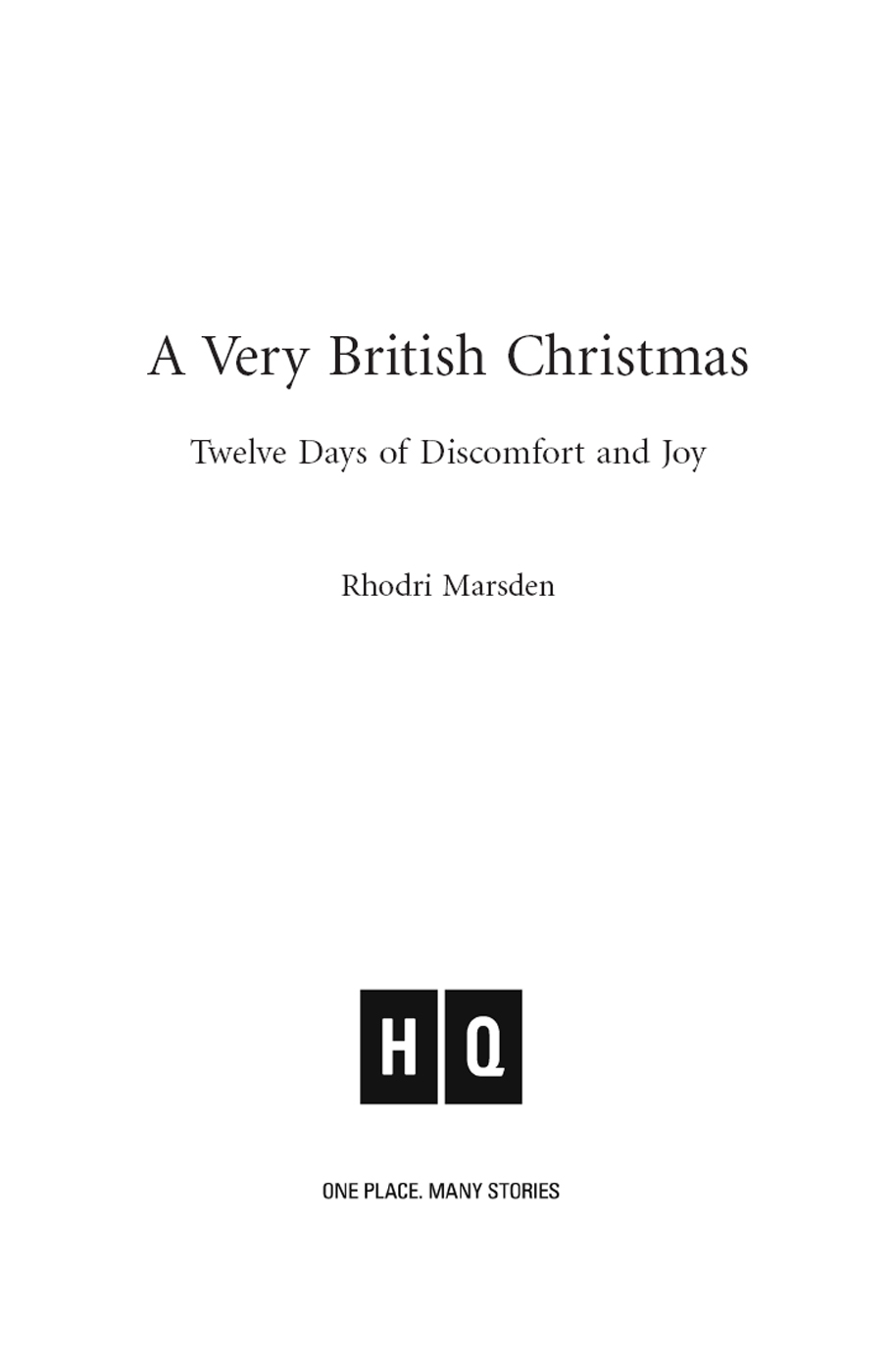
Полная версия
A Very British Christmas: Twelve Days of Discomfort and Joy


You can’t write a book about the British Christmas without speaking to a load of British people, and I’m indebted to the many kind souls who spared me time on the phone or in person to recount their stories and dispense their wisdom.
Special thanks are due to Selena McCubbin, Sarah Bee, Jenny McIvor and Keith Adams, all of whom spent a number of hours sitting at my kitchen table talking about Christmas when they had far more pressing matters to attend to.
My sister, my mum and my dad are mentioned in this book from time to time. I’m grateful to them for not taking out a super-injunction, and also for being there every Christmas, without fail, ready and willing to celebrate in the way we always do.
Contents
Cover
Title Page
Dedication
Introduction
Twelve Gifts Unwrapping
Eleven Sherries Swigging
Ten Carols Screeching
Nine Journeys Trekking
Eight Channels Hopping
Seven Parties Dodging
Six Bargains Grabbing
Five Broken Limbs!
Four Appalling Burps
Three Spare Beds
Two Awkward Hugs
And A Nice Fibre-Optic Tree
Sources for quotations at beginning of chapters
Copyright
Introduction
Imagine if all your Christmases did actually come at once. Whoever coined that idiom was clearly trying to evoke an image of sheer delight, profound happiness and nothing going massively wrong, but the British Christmas doesn’t always turn out that way. Yes, sometimes all the gifts are perfect, everyone is on great form and no one chokes on a mince pie. But on other occasions there will be a heated argument about Tony Blair, or you’ll tip back on your chair and fall through a glass cabinet, or your narcissistic boyfriend will give you a framed photograph of himself as a gift, or you’ll accidentally set your cardigan on fire, or you’ll find yourself on your own in Ruislip and wondering how it ended up like this.
However hard we might wish it, Christmas doesn’t automatically shower good times upon us. Instead, it acts as a kind of emotional multiplier. If things are good, they feel glorious; if things are bad, they feel dreadful. This all makes for a rather intense period of time, and we can indeed be thankful that our Christmases don’t come all at once, and instead space themselves out evenly over the course of a lifetime at regular twelve-month intervals.
As we get older and those Christmases tick by, our attitude towards the whole event changes. We begin our lives having absolutely no understanding of it; we lie there bemused, surrounded by people much older than us who are wearing paper hats and behaving in an unusual way. Within a few years we become ridiculously excited by it, counting the number of sleeps until Christmas, driving ourselves and our families nuts with anticipation. Once we emerge from childhood it becomes an exercise in nostalgia; we remember the way our Christmases used to be and either make great efforts to recreate them, or just wistfully reflect on the fact that we all change year on year, and Christmas inevitably changes too.
The reasons why we’ve ended up celebrating Christmas the way we do are a bit complicated. The credit (or blame) is often laid at the door of Charles Dickens; his hugely popular A Christmas Carol, written in 1843, gave us a rough blueprint of how he felt a British Christmas ought to be properly celebrated, and it’s assumed that we just started blindly following his instructions to the letter. But while Dickens crystallised the Christmas celebration and made it sing for his readers, it’s not as if he made the whole thing up. In The Sketch Book of Geoffrey Crayon, written a couple of decades earlier, the American writer Washington Irving also describes a Christmas spent in Britain, with honourable mentions going to hot booze (‘the richest and raciest wines, highly spiced and sweetened’), masses of food (‘The table was literally loaded with good cheer’) and bored humans (‘a fat-headed old gentleman silently engaged in the discussion of a huge plateful of turkey’). In that sense, Christmas hasn’t changed much at all.
But in other ways, it definitely has. Over the decades we’ve incorporated countless innovations into our traditional celebration: cards, crackers, trees, Royal Christmas messages, advocaat, Slade, Eric and Ernie, Quality Street, John Lewis adverts and much else besides. On top of that are all the family traditions and personal habits, completely unique to you and your kin, which you’d have trouble explaining to anyone outside your immediate circle. That’s the kind of thing that I’m fascinated by, and as a consequence this book feels like less a tribute to Christmas and more a tribute to humanity; it features dozens of stories that give a sense of our uselessness under pressure, our unquenchable joie de vivre, our maverick imaginations, our propensity to behave badly and our sense of the absurd.
Luton, Christmas 1992
When my brother and I were little we both used to collect Panini football stickers. They would have the date of birth of each football player on the sticker, and one year we noticed that Gary McAllister was born on Christmas Day. Now, my family loves Christmas. We really get into it, but we’re not religious. So every year since then, our family has celebrated the birthday of baby Gary McAllister. We’ve just transferred all the stuff to do with Jesus over to Gary McAllister.
Last year my brother sent me a Christmas card that was just pictures of Gary McAllister. We have advent calendars with pictures of Gary McAllister in festive scenes behind each door. My sister-in-law does it, my mum really likes it, too, and on his blessed day of birth we raise a glass to Gary McAllister at Christmas lunch. To be honest, my stepdad isn’t quite as interested in Gary McAllister, but the rest of us have completely embraced the tradition. It’s dumb as hell, but we love it. Gary was fairly famous in the 1990s – I think he played for Leeds? – but no one really remembers him now. We do, though. We love baby Gary.
A. M.
McAllimas1 certainly has a ring to it, but Jesus is obviously the figure around which Christmas pivots – little Lord Jesus, asleep on the hay, about to be rudely awoken by some mooing cattle. (I would like the word ‘mooing’ to be incorporated into ‘Away In A Manger’ instead of ‘lowing’, not that it’ll happen.) But a warning: religion doesn’t feature very prominently in this book – not because I actively spurn belief systems, but if the publishers had wanted it to have an ecclesiastical ring to it they’d probably have asked Reverend Richard Coles to write it instead. In fact, one of the most enjoyable bits of putting this book together was to talk about Christmas with people of other faiths, people who might observe Hanukkah or Diwali or Mawlid during the winter months, but who still ‘do Christmas’ – not in solemn reverence to the Christ Child, but just because they value all the other stuff that Christmas brings: the family, the food, the giving, the receiving, the Top of the Pops Christmas specials. This is the stuff that unites us – well, almost all of us.
Because there are people who don’t like Christmas, and I wanted to hear from them too. Rev. Martin Turner gave a Christmas service at London’s Methodist Central Hall in 2014 where he talked about the lost and the lonely. ‘Guilt weighs them down,’ he said, ‘work wears them out, poverty imprisons them, lack of direction confuses them, the struggles of life agitate them, relationships come and go and hurt them, there seems to be no rest from the pressures of life, no still place, no Silent Night, no Holy Night.’ Many of us battle with these things on some level, and it’s all felt more acutely at Christmas. So you’ll find sad stuff in this book, too, things about love, and loss, and dashed hopes, and breaking your arm while trying to stuff a turkey. That kind of thing shouldn’t be glossed over, so I haven’t.
‘I’m not sure this book would have been commissioned in the US,’ said an American friend of mine the other day, ‘because people consider Christmas to be such a precious and magical thing. Americans have awful times at Christmas, too, but the idea that the awkwardness would actually be acknowledged is ridiculous.’ However, ridiculousness is perfectly acceptable in my book (literally), so I’ve tried to acknowledge all the weirdness of the winter holiday, all its idiosyncratic splendour and all the magnificent flaws dotted throughout it like sultanas in a Christmas pudding. I apologise for rather predictably dividing Christmas up into ‘twelve days’ (as we know, Christmas seems to run for more like fifty or sixty), but across those twelve chapters our cultural icons will be saluted, our national customs dissected, and the people who’ve eaten all the turkey and lived to tell the tale will tell us those tales. Tidings of discomfort, tidings of joy.
Конец ознакомительного фрагмента.
Текст предоставлен ООО «ЛитРес».
Прочитайте эту книгу целиком, купив полную легальную версию на ЛитРес.
Безопасно оплатить книгу можно банковской картой Visa, MasterCard, Maestro, со счета мобильного телефона, с платежного терминала, в салоне МТС или Связной, через PayPal, WebMoney, Яндекс.Деньги, QIWI Кошелек, бонусными картами или другим удобным Вам способом.


